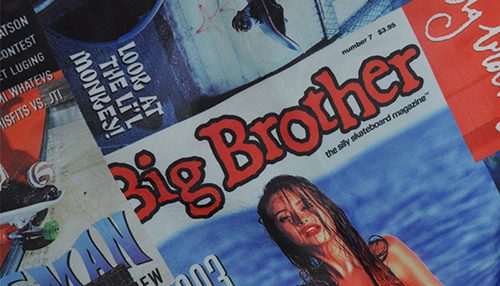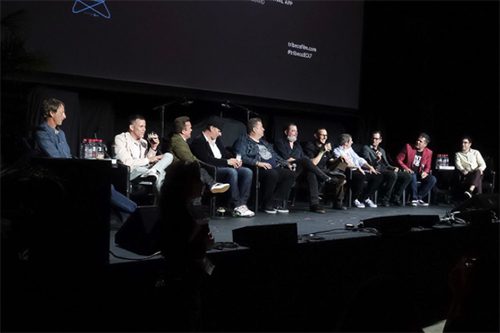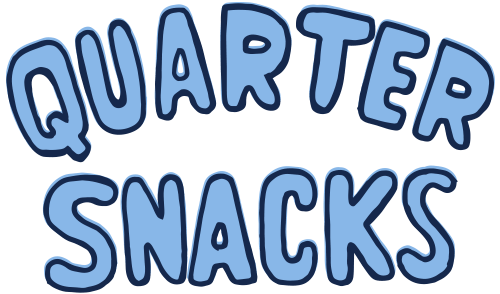
It is not easy to write about Patrick O’Dell’s film, Dumb: The Story Of Big Brother Magazine, and Shit: The Big Brother Book within one year of each other without sounding redundant. Even though it hasn’t published an issue in thirteen years, Big Brother holds a unshakeable stake in skateboarding’s collective heart. Thrasher bears perhaps the most recognizable skate brand on the planet, Skateboarder was the first-ever skateboard magazine, but no, more Big Brother, we need more.
Having covered everything from the cult of Cardiel to Menace throughout Epicly Later’d, O’Dell is the best person to sit across from anyone throwing heart eyes at a mammoth of skateboard lore. The linear story of the magazine is told through a series of new interviews, shoddy unseen footage that otherwise only had its audio transcribed, archived clips from newscasts (i.e. interviews with angry parents), and clips from Big Brother‘s video series.
An abridged history of Big Brother was told in the 2007 Steve Rocco documentary, The Man Who Souled the World. Rocco’s few appearances in Dumb cover the same ground as before, where he recounts the infamous story of why he started the mag in the first place. Unlike the Big Brother book, which apart from the epilogue, was narrated by Sean Cliver and Dave Carnie’s recollections, Dumb‘s interviews cover a wider spectrum of contributors to any and all Big Brother projects.
The magazine’s enduring appeal is in that it spoke to events and characters on the periphery of skateboarding. Take it from me, it is hard to write about skateboarding all the time without feeling like you are repeating yourself. Skateboarding is notoriously difficult to write about, maybe because the feeling it brings is so indescribable. You end up treading between two shitty options — either corny buzzwords about how special it is, or reducing it to technical writing about tricks.
Big Brother had the first editorial staff to discover the greatest hack to writing about skateboarding: you don’t.
Perhaps even more than the book — where it’s easy to take the magazine’s writing for granted because that’s the entire point of the thing you’re holding — Dumb reveals Big Brother‘s influence on the otherwise menial task of skateboard writing.
The formula for the modern tour article where you barely focus on the skating was born in Big Brother, which current Thrasher editor Mike Burnett admits to stealing. Big Brother was the precursor to the awkward “I’m going to ask you all the stuff I’m not supposed to”-Vice interview. (I forget who, but in a panel after the film’s premiere, someone mentioned that an early Vice editor once confessed that “Big Brother was the magazine Vice wanted to be.”) They embraced the fact that they weren’t the eminent skate magazine, so even when actually writing about skateboarding, their focus leaned towards the underrepresented, something current mags have had to catch up to in the internet age. In last week’s Bobshirt interview, Rob Pluhowski says that it was the best magazine because “it gave us bottom-feeders a chance.”
This culture of almost-not-a-skate-magazine also gave them the freedom to shine an equal light on people who were barely skateboarders at all. Dumb‘s third act deals with the magazine’s influential video series. In realizing that the quickest way to an issue’s worth of content was to go on tour, the outtakes from those trips were put on VHS to compliment the lunacy of the magazine. It may seem unremarkable in the YouTube age, but those videos were a casting call for the associations that the mag would form on the fringes of skateboarding. Johnny Knoxville and Steve-O have vivid recollections about how they first came in contact with people who worked for the magazine. At a time when Transworld videos were upping the bar for skate video production, Big Brother was lowering it, only to accidentally set up those living on its pages and in its videos for an MTV series and a four-film franchise.

Photo via Atiba
An undercurrent to Dumb is our underestimation of how conservative the skateboard industry is. Towards the end, Chris Nieratko has a whole “you’re the ones who killed it” bit of vitriol towards skate companies who call for the magazine’s return today, despite having pulled ads during its run. The documentary tries to spin the blame on brands getting sensitive about the mag’s content as advertising revenue dried up, but interviews outside the doc have revealed otherwise. The magazine’s demise was just as much skaters themselves getting tired of being the butt of jokes orchestrated by those living inside the Big Brother bubble.
The batting average of skateboard company comebacks is next to zero; the things we want back the most oftentimes do us the favor of leaving on a high note. Dumb celebrates the pieces of Big Brother shrapnel still running rogue in an industry ultimately based on high-functioning idiots selling four-wheeled toys to children — even if they’re a bit more responsible than an article on how to kill yourself.
Dumb: The Story of Big Brother Magazine premiered at Tribeca Film Festival on April 27th. It will be available for online streaming via Hulu on June 3rd.






Rob Pluhowski Sucks. Skater dads rule!
Trusties don’t suck…viz. Epicly later’d.
This is a more favorable review than I’ve seen elsewhere. Looking forward to it.
Favorite Big Brother joke: Stephen Hawking’s Pro Wheelchair 4. Complete with a THPS style mock-up. I’da played the crap out of that game.
pretty sure it was nieratko that made the “Big Brother was the magazine Vice wanted to be” comment